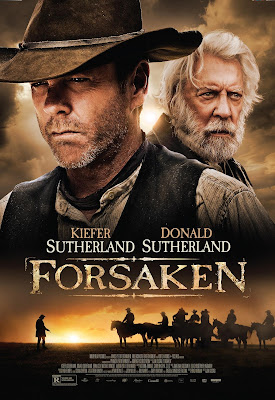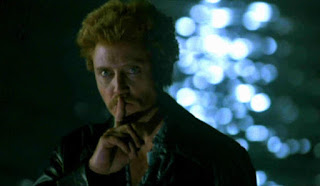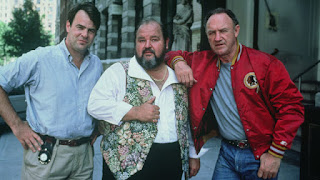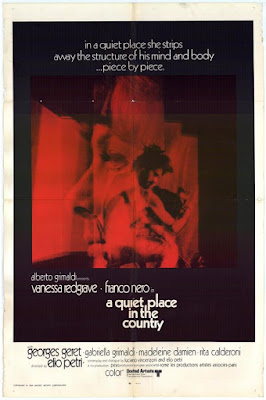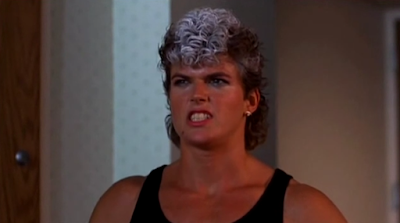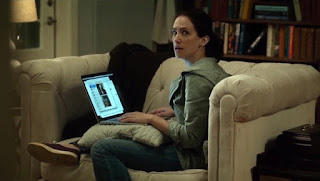MACBETH
(France/UK - 2015)
What would seem like holiday Oscar bait was only given a limited run by the perpetually cash-strapped Weinstein Company, who put all their awards season focus on THE HATEFUL EIGHT and CAROL and only rolled out the latest version of MACBETH on VOD and 108 screens at its widest release. A grim, muddy, and bloody take on the Shakespeare play by SNOWTOWN MURDERS director Justin Kurzel, MACBETH is a proper telling in terms of time period and most of the text ("Double double toil and trouble" is never invoked), but highly influenced by the likes of BRAVEHEART, VALHALLA RISING, and GAME OF THRONES. At times boasting the production design and garish lighting of a horror film, Kurzel's MACBETH has Michael Fassbender in the title role, a leader in the army of King Duncan (David Thewlis). Macbeth and Banquo (Paddy Considine) encounter four witches on a fog-enshrined battlefield, speaking of a prophecy in which Macbeth is made king. Macbeth's ambitious wife Lady Macbeth (Marion Cotillard) goads him into killing King Duncan in order to make the prophecy come true, leading to more murder, madness, guilt, and their ultimate downfall. Viscerally brutal but not quite as blood-splattered as Roman Polanski's essential 1971 MACBETH, probably the best big-screen version of the play (there's also Orson Welles' 1948 version), Kurzel's MACBETH is grand and epic in scope, visually stunning and not at all ornate and stagy like many interpretations. Fassbender and Cotillard are excellent, and they get fine support from Thewlis, Considine, Sean Harris as Macduff, Elizabeth Debicki as Lady Macduff, and Jack Reynor as Malcolm. It doesn't supplant Polanski's take, but it more than holds its own. Kurzel, Fassbender, and Cotillard worked together again on the big-budget video game adaptation ASSASSIN'S CREED, due out later this year. (R, 113 mins)
(Germany - 2015)
There's an admittedly impressive technical achievement on the part of VICTORIA, a German film shot in one uninterrupted 134-minute take that director Sebastian Schipper, cinematographer Sturla Brandth Groven, and the cast pulled off on their third attempt. But after watching VICTORIA and asking yourself "How did they do it?," it's very likely you're next question will be "What the hell for?" A crime thriller where the crime takes place off-camera and the thrills are non-existent, VICTORIA opens in a Gaspar Noe-like strobe-lit club where the title character (Laia Costa), a young Spanish woman living in Berlin, meets a crew of nice enough guys and hangs out with them on a nearby rooftop. She clicks with one, Sonne (Frederick Lau), but an hour later, she ends up being the getaway driver for a hastily-planned robbery they're forced into by gangster Andi (veteran German character actor Andre Hennicke), a former prison acquaintance of Sonne's buddy Boxer (Franz Rogowski). After things predictably go south, Victoria and Sonne find themselves on the run as the cops close in on the area. VICTORIA takes place over a few blocks and Schipper keeps sending his characters in circles as the film plays out in real time and in one take. There's an undeniable accomplishment in the way Schipper coordinated everything in a limited area of real location shooting, but by the end, it doesn't feel like much more than an unedited rough cut of Roger Avary's KILLING ZOE. Because the camera has to follow the characters as they go from one location to another, it's an hour before the robbery even comes up as a subject, and Schipper mainly lets his actors riff and improvise in both German and English, with a couple of flubbed lines and one recovered gaffe where Costa takes a wrong turn during the getaway and Lau, Rogowski, and the other actors in the car start freaking out and telling her to turn the car around, but successfully stay in character the whole time. It shows a commitment by the cast, but to what end? There's absolutely nothing here but the gimmick, and the film's 81% rating (as of this writing) on Rotten Tomatoes is an indicator that critics seem to be praising the technical accomplishment rather than the movie itself. It's not an interesting story when told in this fashion (and it would probably run a leaner, tighter, and much more reasonable 85 or so minutes if told conventionally), the actors aren't really all that great at improv, and whatever appeal Costa establishes as Victoria immediately vanishes when she goes along with such a stupid plan and agrees to get into a car with some guys she met outside a club less than an hour ago, for no other reason than that's what Schipper needs her to do. Intruiging in theory but a deadening endurance test in practice, it's easy to respect the amount of work that went into making VICTORIA (watch Costa's climactic hotel room breakdown, complete with real snot!), but is that supposed to automatically make it a good movie? (Unrated, 138 mins, also streaming on Netflix)
(France/Ukraine/Netherlands - 2014; US release 2015)
In its own way as much of a stunt as VICTORIA, Myroslav Slaboshpytskiy's THE TRIBE is the kind of expectedly grim Eastern European miseryfest that film festival audiences love so much. But be assured, THE TRIBE isn't fucking around when it comes to complete commercial inaccessibility: Slaboshpytskiy shot the film with non-professional actors, all deaf-mute and using Ukrainian sign language with no subtitles, translations or voice-overs. The very concept sounds like a parody of experimental cinema, but Slaboshpytskiy and his neophyte actors manage to tell a story in purely visual and expressive terms, and while specifics may be lost in the non-translation, it's not hard to get the general idea of what's going on. But what's going on isn't something that should've taken over two hours to tell, and in a way that makes the work of Ulrich Seidl look like Garry Marshall. We don't eve know their names until the end credits, but THE TRIBE centers on Sergei (Grigoriy Fesenko), a new kid at a Ukraine boarding school for the deaf and mute. He quickly falls in with a group of powerful students who put him through the requisite hazing rituals before inducting him into their crime ring that's overseen by the hulking woodshop teacher (Alexander Panivan). Sergei is put in charge of transporting two female students that the school-based criminal outfit is pimping out at dive motels and truck stops, and he ends up developing feelings for one of them, Anya (Yana Novikova). The story arc is predictable, with Sergei going full MONA LISA to rescue Anya from her abusive situation. Sloboshpitsky uses a lot of long takes that are reminiscent of VICTORIA, but the film is generally structured in a standard linear fashion using familiar cutting and editing. Boasting a few scattered scenes of explicit sex, THE TRIBE gets more harrowing and brutal as it goes along, with an abortion scene that's difficult to watch and a finale that's memorable, to say the least. It's an unusual film and one that keeps hearing audiences at a distance by design, but it's just pointlessly overlong and there's too many stretches where things get repetitive to the point of oppression. (Unrated, 132 mins)

















